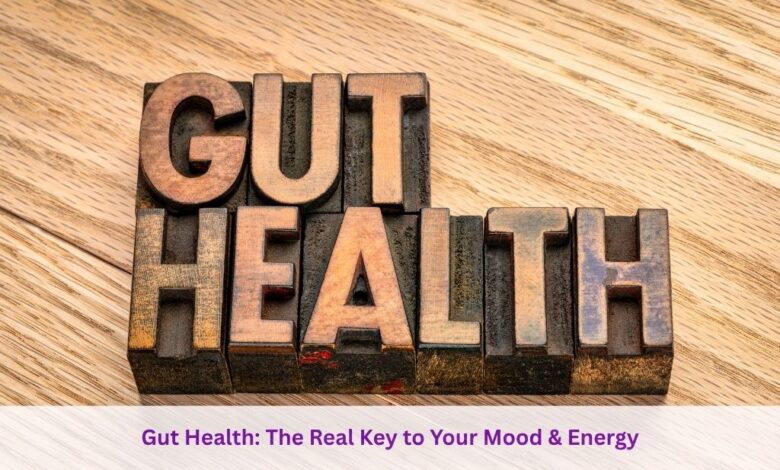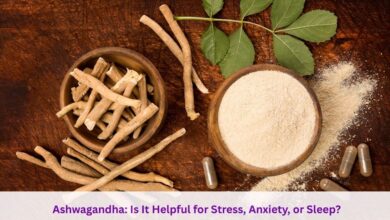Gut Health: The Real Key to Your Mood & Energy

Their schedule’s activity or the amount of sleep they get will affect their mood and energy levels. Yes, those variables are important. What if I told you, though, that more than you believe is under control by a silent engine within? Your guts are that engine. Yes, your gut health the equilibrium of trillions of bacteria living in your digestive system is becoming among the most potent influences on your physical and emotional well-being. It’s no longer just about digestion.
It’s about your sentiments, your energy level, even your way of thinking. Let’s investigate the personal and unexpected link between your stomach, your mood, and your everyday energy. More than just a sense: The Gut-Brain Connection Before a major event, have you ever felt butterflies in your stomach? or lost your appetite as a consequence of stress? That is not chance. Using what is known as the gut-brain axis a sophisticated network of nerves, hormones, and chemical messengers scientists now realize that the gut and brain are in continuous interaction.
Your gut is covered with over 100 million neurons. It is sometimes referred as the “second brain” really. This network of neurons guides digestion but it also sends signals straight to your brain. These signs can affect your emotions, concentration, even behaviour. One of the most revolutionary findings in recent years is that the gut not the brain produces 90% of serotonin, the “feel good” hormone. This alters all we once believed about emotional wellness.
Lower serotonin levels can result from an imbalance, inflammatory condition, or overwhelming of bad bacteria in your gut, therefore contributing to anxiety, despair, or low motivation.
On the other hand, a healthy gut can naturally raise your mood without you even being aware of the source. Get to know your microbiome: The small universe inside you. Collectively known as the microbiome, your stomach is home to a remarkable collection of bacteria, fungi, viruses, and other microorganisms.
These minute species are not opponents. Actually, they are your health companions. Supporting good digestion, controlling immune system, assisting in vitamin production, and even influencing brain hormones a varied and balanced microbiome helps. However, should that equilibrium be upset perhaps by inadequate food, drugs, stress, or toxins the “bad” microorganisms might dominate. You could begin to experience symptoms like: once that occurs Regular weariness, brain fog, constipation or bloating Anxiety or irritability Sleeping difficulties Your stomach sends these warning indicators alerting you that something is off.
Think beginning your day with good sleep only to be sluggish by 10 a. m. It might be attributable to stress or caffeine withdrawal. Your gut could be to blame, though. Food in the intestines is broken down by your body into useful energy. Even the finest foods won’t power you well if your gut is inflamed or not properly absorbing nutrients. Poor gut health can prevent: Iron, vital for oxygen movement in the body, Vitamin B12: essential for nervous system health and energy Magnesium controls nerve and muscle function. CoQ10, an essential molecule in energy generation Moreover, gut inflammation can release into your circulation poisonous compounds known as endotoxins.
These deplete your energy reserves and cause general inflammation. Even with good eating or adequate sleep, you may feel perpetually worn out. Healing your gut could let you reclaim energy you forgot you possessed. Get acquainted with Your Microbiome: The Minute Universe Within You Collectively referred to as the microbiome, your gut is home to an amazing microbial environment made up of bacteria, fungus, viruses, and other organisms. These minuscule life forms are not foes.
Actually, they are your health partners. A varied and balanced microbiome aids in healthy digestion, regulates immune system response, helps create vitamins, and even influences brain molecules. But when that balance tips due to poor diet, antibiotics, stress, or poisons other “bad” bacteria can take over. That starts you seeing symptoms such:-Persistent weariness- Brain fog- Bloating or constipation Irritability or anxiety Trouble falling asleep Your stomach is giving you warning signals that something is wrong.
How Good Gut Health Influences Energy
Start your day with good sleep, but still feel sluggish by 10 a. m. You might blame caffeine withdrawal or stress. The source, though, could be your gut. Food is processed in your stomach and converted into available energy by your body. Even the healthiest foods won’t provide you with much energy if your gut is irritated or not absorbing nutrients properly.
Inefficiency in the gut can stop the absorption of: Iron, which is crucial for oxygen circulation throughout the body Key for nerve health and energy, vitamin B12Magnesium controls muscular and neurological activity. A vital molecule in energy generation called CoQ10Gut inflammation can also release harmful by-products known as endotoxins into your circulation. These set off widespread inflammation and deplete your energy resources. Even if you consume well or get enough sleep, you may feel consistently weary. Restoring your gut could help you to rediscover forgotten energy.
How gut health influences your mood. Mood is not only in your brain. It is also in your gut. Studies reveal that persons with weak gut health have considerably higher chance of experiencing depression, anxiety, and mood disorders. Patients who took probiotics in one clinical study showed significant decreases in anxiety and depressive symptoms occasionally rivaling conventional medicine. why Gut bacteria affect the manufacture of brain molecules including serotonin, dopamine, and Gab all of which are important in mood regulation.
While an unbalanced microbiome can cause emotional instability, a balanced one helps to release these mood-lifting substances. Chronic gut inflammation can also trigger your body’s stress response, hence maintaining high cortisol (the stress hormone) levels. This produces mood swings, irritability, and that wired-but-tired sensation you just can’t get over. – Foods: Fuel or Friction What you consume has a big effect on your gut health. Consider food as either friction or fuel for your digestive system.
Here are some everyday nutritional options affect your intestines, mood, and energy: Harmful Foods: Processed foods: Miss nutrients and fiber, cause inflammation Excess caffeine upsets gut lining and hormone balance. Artificial sweeteners can change gut flora and produce bloating. Healing Foods: Like yogurt, kefir, and kimchi, fermented foods replace beneficial bacteria.
Prebiotics (onions, garlic, bananas): Feed the good bacteriaHigh-fiber fruits and vegetables: Maintain digestive smoothness and floral equilibrium. Bone broth: Helps to heal the gut lining. Healthy fats olive oil, nuts, avocado help gut and brain barrier function. Eating for your gut means feeding, not dieting. Small modifications like stopping sodas or including a probiotic-rich food can have major mood and energy impacts. The Stress-Gut Spiral Deeply connected are stress and gut health.
Your stomach hurts when you are stressed; as your stomach suffers, your stress levels rise. It’s an unending spiral. Stress causes the body to divert blood away from digestion, slows down gut movement, and stimulates the release of cortisol. This damages the gut lining over time and lowers the diversity of good bacteria. You could note: Indigestion on test or deadline Loose stools or constipation while stressed Urge for candy or junk food under pressure situations.
When to Start Looking for Aid Gut imbalance can occasionally become ongoing. If you feel:Constant stomach bloating, acid reflux, or IBS symptoms Rapid mood changes or depression with no obvious cause Persistent fatigue even after modifications to one’s way of living Consulting a functional medicine doctor or gut health expert could be appropriate at this point. Hidden abnormalities may be revealed by tests such hormone panels, food sensitivity testing, or stool analysis. In essence, your guide is your gut. You are what your stomach does with what you consume rather than just what you eat.
Your energy levels, emotional stability, and even your mental clarity all rely on your gut health, the hidden motor driving them. Developing it is a basic pillar of genuine well-being, not just a “wellness trend. “In a society that frequently promotes quick fixes whether it be an energy drink to combat exhaustion or a tablet to balance emotions we have neglected one of the most deep healers at our disposal: our intestines.
The design for how we feel, think, and operate every single day is found in this strong, living ecosystem inside of us. Chasing perfection or following fashionable diets has little to do with gut health. It’s about going back to the fundamentals of food, paying attention to our bodies, and making decisions that promote our inner and outward well-being. We start to unleash a bright version of ourselves we may not have seen in years when we feed our gut with whole foods, give it time to relax and recover, and approach life with somewhat more balance and a great deal more awareness.
Even more empowering is the fact that to get results you don’t have to completely change your way of living. Drinking more water, eating fermented foods, lowering stress, and getting enough sleep
Small changes may clearly affect your mood and vitality within weeks. There is a real, close, and always changing link between brain and intestines. By first focusing on gut health, we are restoring our clarity, attention, and emotional balance rather than only fixing digestion. Therefore, before grabbing a stimulant or searching self-help methods, pause when you next find yourself snapping easily, dragging through your day, or emotionally off-kilter. Listen instead for what your gut could be saying.
Your attitude, energy, and happiness all start to naturally line up when the gut is in harmony. This is not a wellness cliché. It’s biological, true, and exquisitely human. Consider back to a time when you felt really good not just “okay,” but truly energetic, light in your body, emotionally stable, maybe even joyful without any particular reason. It most likely wasn’t during a stretch of bad sleep or a fast food binge. More probably, it was at a period when your body felt supported even if you were not aware of it. That’s the power of interior equilibrium. Your stomach is similar to a garden. If cared for, it produces life-giving resilience, energy, and joy. However, even the most ideal plans can wilt under neglect or overgrowth by weeds such stress, sugar, or processed meals.
As exterior objectives, we sometimes pursue discipline, productivity, or motivation. Sometimes, though, the source of the conflict is biochemical. It is real. It is within. And often, it’s in the gut. Let’s imagine you rise irritable and groggy. You reach for coffee in the hopes it kicks your day forward. Maybe you’re given a temporary lift. And then comes the crash. You feel emotionally weak, disorganized, or merely “off. ” You attempt once more the following day. Same cycle. It becomes your normal eventually. Still, it’s not typical. It is a message. Your gut might be shouting for aid in the language of exhaustion, hunger, swelling, or mood swings. Here’s a secret: When your brain feels safer, your gut is quiet and supported. Your nerve system does not overdrive. Your energy levels become constant. To keep positive or concentrated, you don’t have to fight so tough. It begins to come naturally.
This is why the gut-brain link is transforming; it deals with the source rather than just alleviates symptoms. Many people who begin to repair their stomach see surprising advantages: More profound sleep Sharper concentration Less worry Fewer sweets hunger Fresh motivation They are organic responses meant to restore equilibrium. Healing does not have to be difficult either. It might involve consuming hot herbal tea before bed rather than swiping. Exchanging sourdough for white bread. .
Once every week one evening, selecting rest over hustle. The belief you have to do everything at once is among the greatest myths about wellness. You do not. Your stomach values consistency, not perfection. Walking following meals or drinking kefir are little actions that can start to change your internal chemistry. And here is the most lovely thing: you start to believe your body once more when you show your stomach love.
Fighting food is over. No longer worried about fatigue. Dependency on willpower alone has ended. Rather than your opponent, your body becomes your friend. Start with your gut, then, whether you are a busy mother, a student juggling deadlines, or someone negotiating emotional burnout. Listen to it. Feed it wisely. Let it rest. Trust its signals. Inside you is a powerhouse, not only a digestive system.
Your mood stabilizer, your energy bank, and your emotional anchor are it. Imagine waking up energized, navigating your day with sleeping soundly, being concentrated, and having a steady mood. That is what a good stomach delivers. Thus, next time you feel off, heed your gut instead of simply checking your calendar or your sleep monitor.




